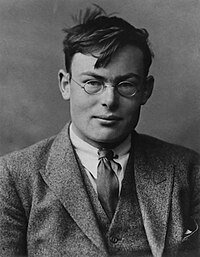F. P. Ramsey
| Frank P. Ramsey | |
|---|---|
 |
|
| Born |
22 February 1903 Cambridge |
| Died | 19 January 1930 (aged 26) |
| Alma mater | Trinity College, Cambridge (BA, 1923) |
| School | Analytic philosophy |
| Institutions | King's College, Cambridge |
|
Main interests
|
Philosophy of mathematics Logic Metaphysics Epistemology |
|
Notable ideas
|
Redundancy theory of truth Ramsey sentences Ramsey–Lewis method Ramsey theory |
|
Influences
|
|
|
Influenced
|
|
Frank Plumpton Ramsey (22 February 1903 – 19 January 1930) was a British philosopher, mathematician and economist who died at the age of 26. He was a close friend of Ludwig Wittgenstein and was instrumental in translating Wittgenstein's Tractatus Logico-Philosophicus into English, as well as persuading Wittgenstein to return to philosophy and Cambridge. Like Wittgenstein, he was a member of the Cambridge Apostles, the intellectual secret society, from 1921.
Ramsey was born on 22 February 1903 in Cambridge where his father Arthur Stanley Ramsey (1867–1954), also a mathematician, was President of Magdalene College. His mother was Mary Agnes Stanley (1875–1927). He was the eldest of two brothers and two sisters, and his brother Michael Ramsey, the only one of the four siblings who was to remain Christian, later became Archbishop of Canterbury. He entered Winchester College in 1915 and later returned to Cambridge to study mathematics at Trinity College. While studying mathematics at Trinity College, Ramsey became a student to John Maynard Keynes, and an active member in the Apostles, a Cambridge discussion group. In 1923, he received his bachelor's degree in mathematics, passing his examinations with the result of first class with distinction. He was named Senior Wrangler. Easy-going, simple and modest, Ramsey had many interests besides his scientific work. Even as a teenager Ramsey exhibited both a profound ability and, as attested by his brother, an extremely diverse range of interests:
He was interested in almost everything. He was immensely widely read in English literature; he was enjoying classics though he was on the verge of plunging into being a mathematical specialist; he was very interested in politics, and well-informed; he had got a political concern and a sort of left-wing caring-for-the-underdog kind of outlook about politics.
...
Wikipedia
